- Home
- Peter Grainger
Persons of Interest: A DC Smith Investigation Page 3
Persons of Interest: A DC Smith Investigation Read online
Page 3
Hinton shrugged.
‘As I said, he’s not my regular man.’
‘In which case,’ said Smith, reaching into his inside pocket, ‘I’ll leave one of these with you. That’s my up-to-date number. Have I got your word that you won’t go bandying this about because if anyone else is found in a distressed condition with my number about their person, it could start to get awkward for me.’
Hinton laughed and took the card.
‘Thanks, Nigel. I’m not after regular updates on the investigation – I know that Terek will have me on a back-burner for a while. But if you do come up with any names that you want to run past me, or whatever, just give me a ring. Alright?’
He went through the door and began the walk to his car, allowing enough time for Hinton to get back down the corridor and out of sight. Then, for the benefit of the on-duty constable, a little slap of the forehead to show that he’d forget that too if it wasn’t screwed on. He turned back towards the door. With a straight face, he went to get his ID card once more and the constable waved it away and opened the door for him.
This time he turned left, guessing that this direction would take him round to the main reception area where visitors would wait before going through security checks – not just those visiting inmates but all trades-people, lawyers and policemen like himself. It should not be too busy at nine o’clock on a Sunday morning.
There were two prison officers behind the screen. He showed them his card, thinking that he ought to get it mounted onto a badge for situations like this in future, and one of the men wrote down details from it into a record book. The other one spoke to him through the grill.
‘Right, sergeant, what can we do for you?’
‘Look, sorry it’s a bit short notice... In fact, it’s no notice at all. But can you tell me whether you still have Billy Slater here? I’ve visited him before but it was a few years ago. If he is, I was wondering whether it would be possible to have a quick word?’
The look that passed between the two officers before either of them spoke only confirmed for Smith that this was close to a million-to-one shot but he put on his most optimistic smile anyway. The older of the two men came closer to the security grill.
‘William Slater is still in residence, sergeant, and that’s a matter of public record. As to whether you can “have a quick word”, I’d have to say that it is highly unlikely for about a dozen official reasons and half a dozen unofficial ones. As I’m sure you must already know.’
Smith nodded sympathetically and straightened up, ready to leave as if he had only got the answer he expected.
‘Not a problem, thanks anyway. When he asked me, I told the superintendent what the answer would be. I’ll go and let him know. He’ll have to go through the governor, won’t he?’
The younger officer spoke behind his hand to the man at the screen, who then turned his attention to Smith again.
‘Is this to do with what’s happening on A wing?’
‘Yes, afraid so. It’s all going on down there this morning. A fast-moving situation, as they say. That’s why there’s no paperwork for anything. Obviously I can’t go into detail. But I’ll go and tell them-’
‘Hold on.’
They had another brief conference and then the younger officer left the security booth. Smith put a thumb up as a question, and the remaining officer nodded and indicated that Smith should take a seat – whatever the answer, it would take several minutes to arrive.
He looked around the waiting area – no smoking, of course, and no sign of a door leading to the outside. No superfluous doors in this place... What was it the inspector had said? “You must be responsible for putting some of them in here.” He wondered how many, and how many were still here, eating the prison breakfast this morning because their misdemeanours had happened to cross his desk. He felt no guilt about that and never had; in fact, there was a little black book at home in his study that listed the names of people who ought to have spent some time here and would do so yet if he had any say in the matter. But sitting here now, the sun streaming in through the side windows – well, it made you think. Does it actually work, putting wrong-doers in a place like this? It ‘works’ with regard to the dangerous ones because it keeps the general public out of their way, and the longer the better; for Smith, life would mean life, and the only reason he did not favour the death penalty for the worst of them was because he knew only too well that policemen themselves are fallible, that judges and juries makes mistakes, that the system never has been and never can be perfect.
But he also knew that those men, the men that truly deserved the label ‘evil’ were a tiny minority. If there were five hundred prisoners here, perhaps five of them would have the emptiness behind the eyes that puts them beyond all hope of redemption. What about the rest? What about the low-level repeat offenders, the recidivists who took up eighty or ninety per cent of his team’s time, year in, year out? Was prison working for them? And that was not the worst of it, of course, because beneath them, at the bottom of this heap, were the inadequate, the addicted, the homeless, the mentally ill who would all spend time here in the end if society could find no other answers for them.
A door to the left of the security booth opened and an officer stepped out – another officer, not one of those to whom he had spoken some minutes ago. Smith stood up and the officer came towards him, a small, upright man, no taller than Smith himself, a man who had been taught to march properly and had not stopped doing so ever since. Before he had arrived at a conversational distance, Smith had noted the star on the shoulder that identified him as a Senior Prison Officer, responsible for a number of others on a wing. Behind him, the two officers in the booth had their heads down.
Before Smith could introduce himself, he had been silenced and directed towards an alcove in a corner of the waiting area where they were out of sight and earshot of anyone else that might arrive in reception.
‘And you are?’
Smith took out his ID.
As he studied it, the officer said, ‘And you just asked to make contact with William Slater. Why?’
Smith weighed it up. The stunt that had got him past the first two officers would not get him past this one – a slight change in approach was called for.
‘It is to do with what’s going on in A wing this morning, but only indirectly. I’ve been involved in that, and I thought while I was here that it might be an idea to speak to Billy, off the record. We’re old sparring partners.’
The officer’s name was Ward. He blinked once or twice as he considered what Smith had said, and the small, clipped moustache contracted a little as his mouth chewed it over as well. Smith guessed that he had done not less than twenty years in one of the military services.
‘Prisoner Slater did seem to have some recollection of you – I can’t say whether it was a fond one or not, sergeant.’
‘We only know each professionally. If he doesn’t want a word, I quite understand. I won’t make a nuisance of myself.’
Officer Ward thought that over in the same unhurried way before he spoke again.
‘Prisoner Slater did not seem averse to having a word but not this morning.’
‘I see. I expect things are a bit all over the place, aren’t they, with what’s happened?’
‘Things are perfectly in order. He says he can’t come because he’s going to chapel.’
‘Oh, right. Well, that’s a promising sign, isn’t it?’
The moustache twitched ever so slightly, and that was as close as he was likely to get to a smile in this conversation.
Smith said, ‘What if I get a visiting order and come in unofficially?’
A shake of the head.
‘With respect, sergeant, you look as if you’ve been in the game for a while. Every chance that one of the other inmates or their loved ones in the visiting area will realise who you are.’
‘OK. What’s the best way forward?’
The officer pointed to his badge.
‘Easy enough to remember, isn’t it? Warder Ward?’
‘Unforgettable.’
‘Call the main number and ask for me – if I can come to the phone, I will. Suggest a time and I’ll find a private room. At the moment we’re short-staffed. There’s a morning lock-in from 10.30 to noon and another from three until four in the afternoon – that would be best.’
‘Thanks. I appreciate it.’
Warder Ward had something else to say, and he made no attempt to hide the fact that he was looking around before he said it.
‘If you ring, there is no need to say who you are, or should I say, what you are. And if you can’t reach me, no need to explain to anyone else. Just call back until you get me...’
He waited until Smith nodded his understanding. Then he turned smartly on his heel and headed back towards the door from which he had emerged. The two officers in the booth still had their heads down.
Back in his car, Smith made himself think about other things for a minute or two; that little bit of space is sometimes invaluable. Lovely weather, going to last the rest of the day. He would catch up on the garden this morning – the drive back would only take an hour – cut the lawn, tidy up the spring flowers, maybe even put that coat of wood-stain on the garden shed. After lunch, the afternoon would be his own – he could go anywhere and do anything he pleased, even drive over to the caravan. But he did not know what time she planned to leave, and just turning up again, after departing unexpectedly yesterday, might look... He didn’t know but it might look something. He could send a text maybe, but wasn’t sure what it might say.
Still, the morning which had begun, potentially at least, rather badly had turned out be rather interesting. He might have a lead in the case in which he was still a person of interest, at least to Detective Inspector Terek. Terek? A strange name. He’d have to look that one up. But Billy Slater had clearly indicated that he might have something for him. The really interesting thing, though, was how cautious he was being about that. Slater was a high-status prisoner, accustomed to being near the top of the all-important hierarchy that dominates prison life. A man, therefore, not accustomed to having to worry too much about what he was getting up to – but he was, if not worried, certainly concerned enough to go only through a trusted officer like Ward. Ward had understood the situation perfectly, too, as highly experienced officers do. The only remaining question was, what exactly is that situation? How much light would the answer to that throw on the death of Lionel Everett?
Smith needed a day to look into it from Kings Lake Central, assuming that he would be allowed back into the office tomorrow morning, and allowed to log on to the computer. One day, maybe less, and then he would be able to fix something up with Warder Ward. First thing in the morning, then... And then he remembered it – the three hour meeting that he must attend, the meeting being led by the Regional Serious Crimes Unit, putting drugs back at the top of the agenda. Again.
Chapter Three
Detective Chief Inspector Cara Freeman looked out across the meeting room. It was full, and extra chairs had been brought in – there must be more than forty officers looking back at her, waiting for her to begin after Assistant Chief Constable Devine’s introduction to the morning. He had underlined the importance of this new initiative, and now it was up to her to make it sound convincing. She felt a little shaky but this was what she had wanted, what she had worked for – the higher profile, getting her face and her name known among the higher ranks of the county’s constabulary. She pressed a button on the laptop, and the screen behind her lit up.
‘Some of you will be saying to yourselves “Here we go again” or “We’ve heard it all before.” In some ways that is understandable because the problems of drug abuse and its associated criminality have been with us for a long time now...’
Smith sat out there, in the fourth row, and in trying not to catch his eye as she said that opening sentence, she looked away from him and then back at him so obviously that he probably had taken it to be aimed at him. It was more than two months since she had personally come to Kings Lake Central and asked him, face to face, to reconsider his refusal to join the new Regional Serious Crimes Unit – she had even come armed with a proposal that he could spend six months with the unit and then decide whether he wished to continue, something that ACC Devine had not agreed to willingly. It made no difference in the end, as Smith had continued, politely, to decline their offer.
‘... a new unit and a new approach. These are needed because we undoubtedly are being confronted by new challenges in the way that the supply of drugs is being organized. And it is highly organized...’
To be fair, on the day that she and Terry Christopher had visited the Elizabeth gas platform, they had had another agenda entirely to the two detectives from Kings Lake who accompanied them; they had been told to focus on the possible security implications of a missing rig worker, but even so – how had the somewhat untidy and vaguely distracted sergeant managed to turn that into two men on remand facing manslaughter if not murder charges? Had he known something beforehand that he had not shared with them? If not, what had he seen on the day that made him pursue the case as he had? And there was another ‘if’; if she had not read his file, she would have concluded there had been an element of luck in it all. But she had read the file, and that was why she had gone back to Kings Lake to try again.
‘... it is important to understand that what we are putting in front of you today is not a proposal. It is not a consultation. The strategy has been agreed at the highest level, and it will be part of a fully integrated approach to these problems across a number of forces. But it will not be successful without the whole-hearted support of you, the officers at the coal-face, the people out there who confront these issues every day of your working lives...’
She hoped that it didn’t all sound too Churchillian. What would someone like Smith make of it? He seemed to be listening.
Terry Christopher sat on the third row, a little to the right of and just in front of the sergeant that they had met out on the gas platform. He had turned round once before the ACC had opened the meeting, and the sergeant had smiled broadly at him and said hello – somehow it had seemed too friendly, almost inappropriate. Terry had mumbled something and turned away. He could not see why DCI Freeman had tried twice to get the man into the RSCU, and, to tell the truth, he was glad that she had failed to do so.
But she was doing well up there, as he had known she would. He was still a little star-struck, he knew that, but someone senior had had a quiet word with him months ago and said, hang on to her coat tails and you’ll go far, and nothing that had happened since had given him cause to doubt it. And she had allowed him to go through the draft of what she was saying – without his input, just here and there, it would have sounded different. In some ways, he was already influencing policy and the policing of the future.
She reached the end of her piece and was handing over to the inspector who would run through the data upon which the new strategy was based; a polite spatter of applause made him turn around again, clapping himself and wondering who else was doing so. The sergeant caught his eye again, the same quite unnecessary smile that was almost an inane grin. There must be something wrong with the man.
Detective Superintendent Allen had positioned himself on the outside of the main group of officers, a little apart like a teacher in a school assembly. He had also completed a quick headcount, and was sure that every Kings Lake officer that should be here was here – he couldn’t speak for the detectives who had been invited from other stations but that was not his concern. Leaning back in his chair and crossing one leg meant that he could view the emails on his iPad, too, saving a little time for later in the day, this meeting ending, supposedly, before lunch. He had long since passed the point of being flattered when his station was chosen to host such things; they were like the king’s visits of old, honours that actually wasted vast amounts of time and resources. The sooner they were ove
r, the better.
He read again the email from his opposite number in Huntingdon. The investigation into the murder of the convict, Lionel Everett, was at an early stage. A number of avenues had yet to be explored but... “Avenues”? Who on earth did the man think he was writing to? It sounded like a press release. However, at this point in time they did not feel that the officer concerned, Detective Sergeant David Smith of the Norfolk constabulary, was likely to have had recent contact with Lionel Everett, in view of the fact that the mobile telephone number had not been in use for some months. Therefore...
Allen wrote a short email of his own to Detective Inspector Reeve. The first version included the phrase tell Smith to carry on as normal – then he had second thoughts and deleted that. Telling Smith to carry on as normal might not be wise, because normal for Smith was not the same as it was for other people. Last Saturday morning, for example, having to come in for two hours and sort out this phone number business; for most officers, being involved in something as odd as that would be a once-in-a-lifetime experience but it wasn’t for Smith – it was normal for Smith. After a little thought, he wrote tell him that line of inquiry is not being pursued at present, pressed send and said a silent prayer that that was the last he would hear of the business.
Smith was sitting in the fourth row, his back straight even though they were an hour and half into this now, facing forward and apparently paying attention. The thought of him being involved in anything untoward was ludicrous. Allen gave a tiny snort to show just how ludicrous it was. The man was incorruptible. Incorrigible but incorruptible.
Smith was studying the ring on Terry Christopher’s third finger and wondering about the woman who had placed it there – presumably it was a woman. Someone had placed it there, and plighted their troth to the sergeant from the Regional Serious Crimes Unit; he had to keep thinking and saying it in full ever since Charlie Hills had pointed out to him that the acronym, when spoken aloud, had a number of impolite possibilities. Afterwards, he had said to Charlie a number of times that that was the real reason he did not feel that he could become a member of it.

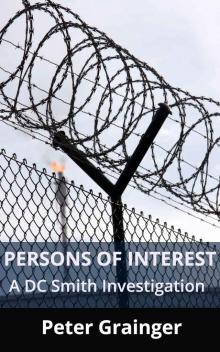 Persons of Interest
Persons of Interest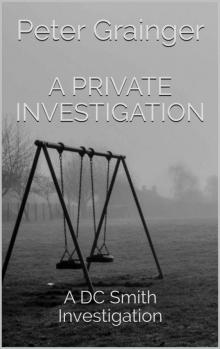 A Private Investigation
A Private Investigation Songbird
Songbird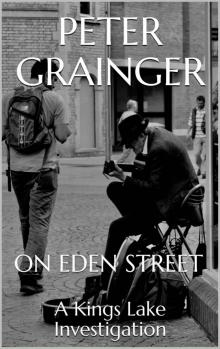 On Eden Street
On Eden Street An Accidental Death
An Accidental Death Time and Tide
Time and Tide An Accidental Death: A DC Smith Investigation
An Accidental Death: A DC Smith Investigation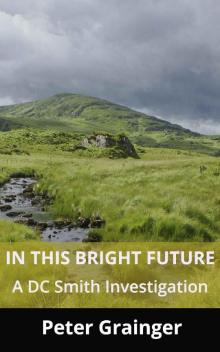 In This Bright Future
In This Bright Future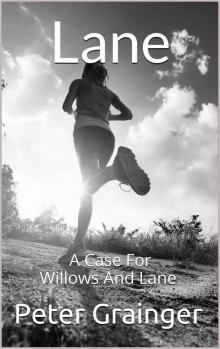 Lane: A Case For Willows And Lane
Lane: A Case For Willows And Lane The Rags of Time: A DC Smith Investigation
The Rags of Time: A DC Smith Investigation Luck and Judgement
Luck and Judgement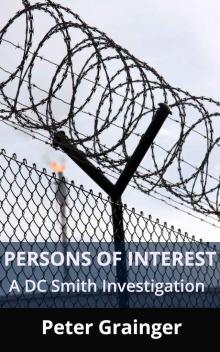 Persons of Interest: A DC Smith Investigation
Persons of Interest: A DC Smith Investigation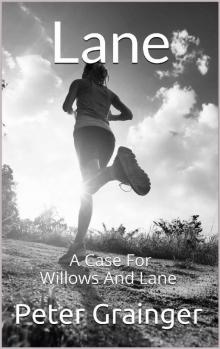 Lane
Lane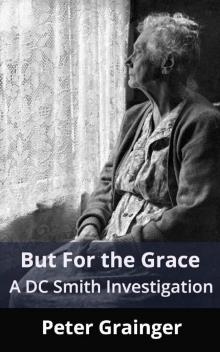 But For The Grace
But For The Grace Time and Tide: A DC Smith Investigation
Time and Tide: A DC Smith Investigation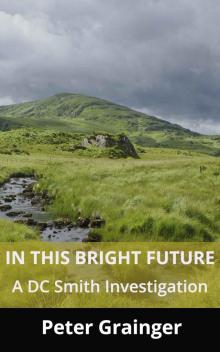 In This Bright Future: A DC Smith Investigation
In This Bright Future: A DC Smith Investigation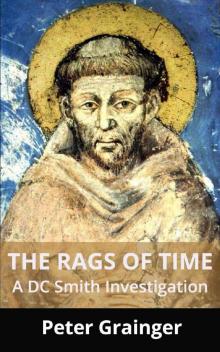 The Rags of Time
The Rags of Time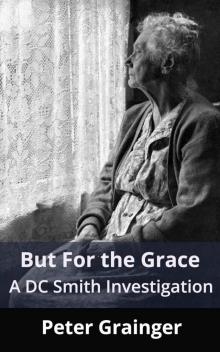 But For The Grace: A DC Smith Investigation
But For The Grace: A DC Smith Investigation Luck and Judgement: A DC Smith Investigation
Luck and Judgement: A DC Smith Investigation